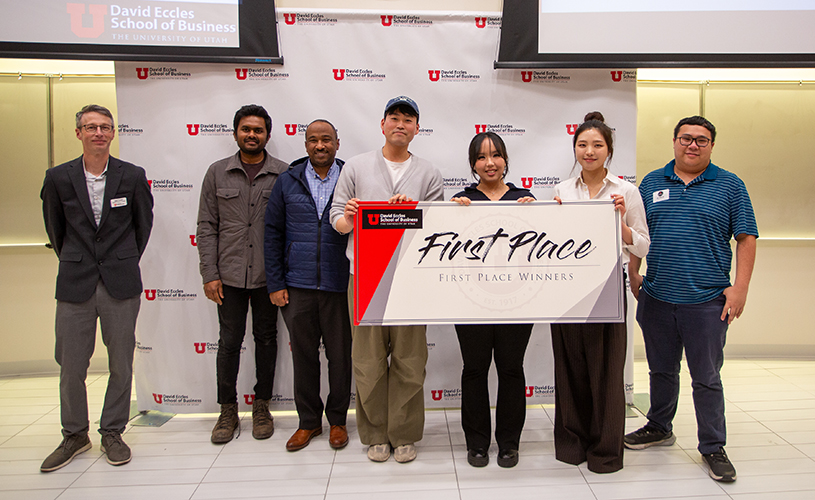at the University of Utah
Pixels to Prototypes: Eccles Students Tackle Real-World Challenges at 2025 Generative AI Hackathon
Innovation returned to the David Eccles School of Business in full force as 90 students across 27 teams gathered for the second annual Generative AI Hackathon. Hosted by the Information Systems program, this hackathon challenged students to do more than just code — it pushed them to move fast, think strategically, and use tools like ChatGPT, Claude, and Midjourney to solve a real-world business problem.
Each team took on the role of a digital agency pitching a new website for a fictional but highly specific client: Children’s Steps Pediatric Hospital. The twist? The client expected generative AI to be integrated throughout the process, from development to storytelling to branding.
In just six hours, student teams were tasked with:
- Building a working healthcare website from scratch using the Retool platform
- Generating original brand assets like logos and images using AI
- Creating authentic, AI-generated patient testimonials with ethical transparency
- Strategically integrating AI features to streamline UX and reduce development costs
With just six hours to ideate, build, and present, students had to move fast and think smart. From intelligent chatbots that helped families navigate care across multiple locations to AI-generated patient narratives that reflected empathy and trust, the level of sophistication on display was incredible.
Each team was evaluated by a panel of judges comprised of Eccles School faculty, alumni, and industry professionals. Teams were evaluated on creativity, execution, and ethical integration of AI into their solutions. What stood out wasn’t just technical know-how, but the depth of thinking behind each team’s strategic approach.
“The Gen AI Hackathon was challenging, particularly in the task of creating a functional and visually appealing website while simultaneously using AI to build everything and incorporating AI into the website itself in a unique and innovative way — all within just 6 hours,” said Jayden Dunn, a sophomore majoring in Information Systems and Finance. “Looking back, I learned that hackathons are best done in person to maximize collaboration. My team and I had a wonderful time competing — and we probably learned more in 6 hours than we would have in several days.”
This year’s sponsors — Shoreline Health, SLCC U of U Herriman Campus, Pepsi, and Doman Innovation Studio — played a crucial role in making the event possible and supporting the next generation of AI-literate leaders.
The 2025 Generative AI Hackathon proved once again that Eccles School students aren’t just learning AI, they’re learning how to lead with it and gaining real-world experience tackling complex challenges with tools that are already reshaping the business landscape.
As generative AI continues to evolve, events like this are preparing the next generation of business and tech leaders to think critically, act ethically, and build with impact.
With growing momentum and student interest, plans are already in motion to expand future hackathons — bringing in new challenge formats, deeper industry collaborations, and even broader AI applications across sectors.
One thing’s clear: Eccles students are ready for what’s next, and they’re not waiting for the future — they’re building it.
Congratulations to our 2025 Generative AI (ChatGPT) Hackathon Winners!
Winners:
First Place
Team CSIS
- Sam Im
- Hyejun Park
- Gloria Shin
Second Place
Neural Nexus
- Rahul Ramesh
- Rishi Ramesh
- Dallin Webb
Third Place
Bayesian Ballers
- Prachi Aswani
- Julia Duffy
- Tobias Lux





